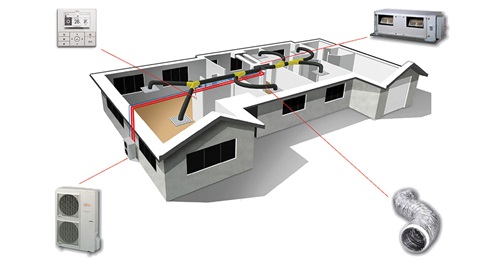How Often to Service an Air Conditioner?

If you’re wondering exactly how often to service your air conditioner, the answer generally depends on usage, but regular checks are essential. Air conditioners should generally be serviced every 1–2 years by a licensed technician, depending on how often the unit is used and how extreme the local conditions are.
Keeping up with routine maintenance ensures your air conditioner continues to cool or heat effectively while keeping energy costs under control.
Should I Get My AC Serviced Every Year?
Most households benefit from having their air conditioner serviced every year, especially if the system is used heavily throughout summer or year-round. Maintaining a yearly AC unit service keeps the air conditioning in your home running efficiently, prevents unexpected breakdowns and helps extend the life of the unit.
Booking an air conditioning service ensures your system is inspected, cleaned and tested by a service technician.
How Often Should Ducted Air Conditioning Be Serviced?
Ducted systems are best serviced on a yearly basis, especially before peak summer or winter months. Because ducted air conditioning cools or heats multiple rooms through a network of ducts, there are more components to maintain compared to a single split system. This includes checking and cleaning the ducts, inspecting the fan coil and ensuring the zone controls are working properly.
When an air conditioner is in constant use or if airflow drops, it’s worth booking a service sooner.
How Often Should a Split System Air Conditioner be serviced?
A split system air conditioner will generally require servicing every 1–2 years, depending on usage. Because split systems cool or heat individual rooms rather than the whole home, they typically require less maintenance than ducted systems. Still, knowing how often to service an AC unit is important for preventing small issues from becoming costly repairs.
It’s also worth keeping an eye out for signs your system may need servicing sooner than scheduled. Unusual noises, weak airflow, unpleasant odours or a sudden rise in energy bills can all indicate your unit is struggling. Booking a service when these issues appear helps prevent bigger problems.
No matter the type of air conditioner that you have, regular maintenance will help to maintain air quality, lower energy usage and extend the lifespan of your system.
Recommended Service Schedule for Fujitsu ACs
To keep your Fujitsu system performing at its best, it’s important to know how often should an air conditioner be serviced. If your unit is running heavily through summer or used year-round for heating and cooling, then at a minimum, it should be serviced once a year. Here are recommended service schedules based on how often you use it and the environment it operates in.
Light use – If your AC is only used occasionally or in one season, a professional service every two years may be enough.
Regular or heavy use – For households that run the system daily through summer or year-round with heating and cooling, annual servicing is best.
Environment – Houses close to the ocean or in dusty locations may need extra servicing, as dust and salt can build up and affect performance.
It’s a good idea to start planning your next service ahead of peak seasons, for example, in spring before the summer cooling load or in early autumn before relying on heating for winter. This ensures your system is ready to handle the busiest times of the year without interruption.
For expert advice and reliable servicing, contact us today. Fujitsu's experts can help you keep your air conditioner in top condition so you can stay comfortable and save energy all year long.

.tmb-tmb420.jpg?sfvrsn=5c4be2e1_1)


